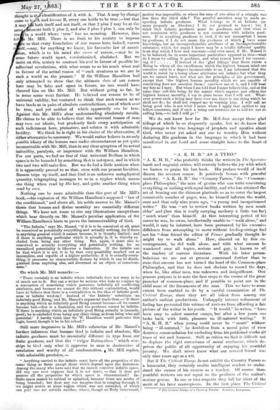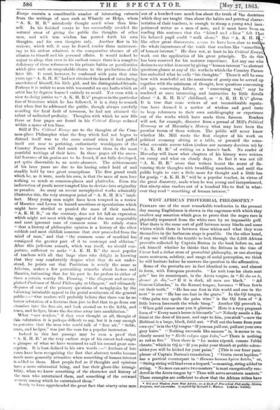" A. K. H. B." AS A TYRO.*
"A. K. H. B.," who probably thinks the writers in The Spectator harsh and ungenial critics, will scarcely believe the joy with which we hasten to praise his last book. His preface would of itself disarm the severest censor. It positively beams with graceful modesty. "A. K. H. B." the "Country Parson," the " Common- place Philosopher," the man of genius who can write concerning everything or nothing with equal facility, and who has attained The art of beating out the thinnest platitude so as to cover the largest conceivable number of pages, was, he himself informs the world, once and that only nine years ago, " a young and inexperienced writer." He was "set to review books written by men much older" and (but this is really carrying modesty a little too far) "much wiser" than himself. At that interesting period of his career he was, he owns, intellectually unable to " walk alone," and would, it may be inferred, have been prevented by his excessive diffidence from attempting to move without leading-strings had not his "dear friend the editor of Fraser gradually -thought he might try to walk alone." How, cheered on by this en- couragement, he did walk alone, and with what success he wandered over all topics, serious and gay, is known to all the readers of current literature. With his later peram- bulations we are not at present concerned further than to state that success has not turned the head of the Common-place Philosopher, and that he does not disdain to record the days , when he, like other men, was unknown and insignificant. Our present purpose is to note the first steps in the course of the great preacher of common-place, and if possible to point out in the child some of the lineaments of the man. This we have to some extent been enabled to do by a careful examination of The Critical Essays, since they are all taken from among our author's earliest productions. Unhappily intense refinement of feeling has prevented this volume of reviews from affording a fair picture of the writer in his youth. " It would," he writes, " have• been easy to select smarter essays, but after a few years one looks back with little pleasure on ill-natured writing." If -" A. K. H. B." when young could never be "smart" without being " ill-natured," he doubtless from a moral point of view deserves commendation for excluding from his published works all trace of wit and humour. -Still as critics we find it difficult not to deplore the rigid correctness of moral sentiment, which de- prives the public of all opportunity of enjoying his youthful jocosity. We shall never know what our revered friend was only nine years ago as a wit.
But if The Critical Essays do not exhibit the Country Parson as a htamourist, they certainly enable intelligent readers to under- stand the causes of his success as a teacher. Of course these youthful reviews are not equal to the products of the author's mature genius. In one or two respects they fall far short of the merit of his later masterpieces. In the first place The Critical 7'he Critical Essays of a Country Parson. London : Longman.
Essays contain a considerable number of interesting extracts from the writings of men such as Whately or Helps, whom " A. K. H. B." mistakenly thought much wiser than him-
self. In his finished essays he has successfully avoided the natural error of giving the public the thoughts of other men, and with true wisdom has poured forth his own thoughts, and his own thoughts only. Another flaw in his reviews, which will, it may be feared, render them uninterest- ing to his ardent admirers, is the comparative absence of all allusion to himself and his personal affairs. It would indeed be unjust to allege that even in his earliest essays there is a complete deficiency of those references to his private habits or peculiarities which give such an unspeakable charm to the productions of his later life. It must, however, be confessed with pain that nine years ago "A. K. II. B." had not obtained the knack of introducing anecdotes of himself, his little girl, and his distinguished friends. Perhaps it is unfair to scan with too careful an eye faults which an artist has by degrees learned entirely to avoid. Yet even with a view to doing justice to " A. K. II. B.'s" progress in the particular line of literature which he has followed, it is a duty to remark that when first he addressed the public, though always carefully avoiding the fatal fault of terseness, he had not attained the talent- of unlimited prolixity. Thoughts with which he now fills three or four pages are found in his Critical Essays reduced within a apace of ten lines.
Still if The Critical Essays are to the thoughts of the Com- mon-place Philosopher what the frog which had not begun to distend itself was to the same animal when it had puffed itself out near to perishing, enthusiastic worshippers of the Country Parson will find much to interest them in the most youthful writings of their hero. In these pages all the essen- tial features of his genius are to be found, if not fully developed, yet quite discernible to an acute observer. The achievements of his later years are due to his having seized hold of and steadily held by two great conceptions. The first grand truth which lie, as it were, made his own, is that the mass of men love nothing so much as common-places and platitudes. Even the indiscretion of youth never tempted him to deviate into originality or paradox. An essay on recent metaphysical works admirably illustrates this, the very strongest point of " A. K. H. B.'s " intel- lect. Many young men might have been tempted in a review of Maurice and Lewes to hazard assertions or speculations which might have startled or puzzled the mass of their readers. " A. K. H. B.," on the contrary, does not let fall an expression which might not meet with the approval of the most respectable and most ignorant man of common sense. lie calmly states " that a history of philosophic opinion is a history of the vilest rubbish and most childish nonsense that ever proceeded from the mind of man," and that " the common sense of mankind has consigned the greater part of it to contempt and oblivion." After this judicious remark, which was itself, we should con- jecture, sufficient to make " A. K. II. B." the most popular of teachers with all that large class who delight in knowing that they may comfortably despise what they do not under- stand, he points out that Positivism is nearly the same as Atheism, Makes a few patronizing remarks about Lewes and Maurice, intimating that for his part he far prefers to either of them a certain worthy Dr. Fleming, " the eloquent and accom- plished Professor of Moral Philosophy at Glasgow," and ultimately disposes of one of the primary questions of metaphysics by the following inimitable appeal to the genial sentiments of the general public Our readers will probably believe that there can be no better refutation of a doctrine than just to feel that to go from our chamber into the free air, and look around on to the fields, and trees, and hedges, blows the doctrine away into annihilation." What " our readers," if they ever thought at all, thought of this refutation it is perhaps difficult to say, but it is easy enough to perceive that the man who could talk of " free air," " fields, trees, and hedges," was just the man for a popular instructor.
Indeed in this last passage may be seen a proof that " A. K. H. B." at the very earliest steps of his career had caught a glimpse of what we have ventured to call his second great con- ception. It is best defined in his own words :—" Authors of late years have been recognizing the fact that abstract truths become much more generally attractive when something of human interest is added to them. Most people feel as if thoughts and opinions have a more substantial being, and lose their ghost-like intangi- bility, when we know something of the character and history of the man who entertained them, and something of the outward scenery among which he entertained them."
Surely to have apprehended the great fact that ninety-nine men
out of a hundred care much less about the truth of the doctrines which they are taught than about the habits and personal charac-
teristics of their teachers, is enough to stamp a young anal inex- perienced writer as a man of note, and it must have btoen on reading this sentence that the " friend and editor " felt that his beloved pupil could " walk alone." But " A. K. H.
like other great discoverers, 8.'21113 to have been slow to rea
the whole importance of the truth that readers like " somethin, of human interest." He does not, at least in his Critical Essays, work out the application of his great principle. To do this has been reserved for his maturer experience. Let any one who desires to see what is meant bygiving " human interest " to abstract questions glance at any of the works in which the Country Parson has embodied what lie calls "his thoughts." There it will be seen how with wonderful art the maximum of gossip can be served up together with the minimum of thought, how questions concerning old age, concerning failure, or " concerning veal," may be rendered at once interesting and instructive by little details about " A. K. H. B.'s" childhood, or " A. K. H. B.'s" gloves. It is true that some writers of not inconsiderable reputa- tion have deemed it a matter of wisdom and good taste to keep references to their own autobiography or experience_ out of the works which have made them famous. Readers will not, for example, discover from a perusal of Mill's Political Economy or of Macaulay's History what may have been the peculiar tastes of these writers. The public will never know whether Mr. Mill wrote the first chapter of his work on political economy sitting at a table, or purafted the seine- what eccentric course taken (unless our memory deceives us) by "A. K. H. B." of writing on a horse's back. No reader of Macaulay will know what chapters of his history were written on sunny and what on cloudy days. In fact it was not till "A. K. II. B." arose that writers learnt the secret of fla- vouring 'their thoughts with twaddling anecdotes, and until the public begin to care a little more for thought and a little less for gossip, " A. K. H. B." will be a popular teacher, in virtue of the great discovery, made when he was young and inexperienced, that ninety-nine readers out of a hundred like to find in what- ever they read " something of human interest."



































 Previous page
Previous page